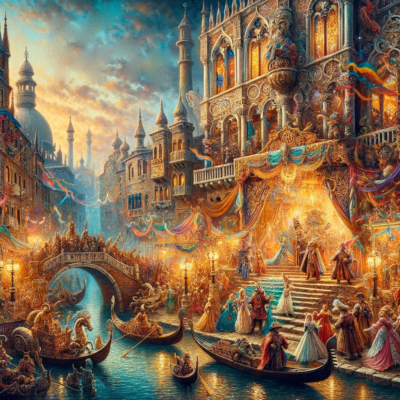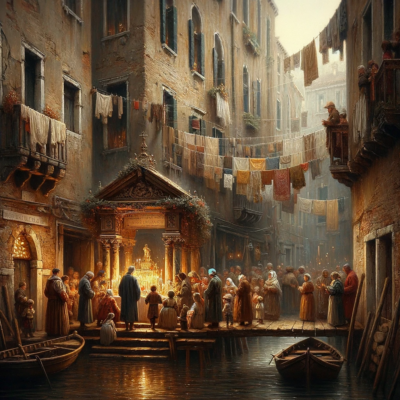News, Swords of the Serpentine
The Holidays of Eversink: Using festivals for plot hooks in Swords of the Serpentine
 by Kevin Kulp
by Kevin Kulp
Eversink is a city of shimmering festivals, holidays and raucous celebration. The city is alive and alight during holidays, often flooded with food and festivity (and actual water, considering the irritating local tide table). Here are a few of the better-known holidays and celebrations.
Scouring Day (civic, popular)
Eversink’s narrower canals tend to clog during summer and winter; you’ll notice the silt, the sewage, the garbage, and the occasional corpse. That’s a great excuse for Scouring Day, a twice a year 3-day holiday every spring and fall when a deadly regatta is held by the Guild of Architects and Canal-Watchers. Incredibly fast-moving water (that is not sorcerously propelled, don’t be ridiculous) scours the canals clean while brave competitors use the dangerous currents for boat races through the city and out into the Bay of Coins.
Neighborhoods practically go to war when supporting their favorite competitors. Neighborhood teams compete in a variety of fast-paced races from the upper tip of Alderhall to the far edge of Harbor Approach, carried at breakneck speeds through the water via a variety of dangerous and narrow twisting canals. Everyone cheats, the best routes are carefully mapped out and guarded, the street food is astonishing, fortunes are won or lost on the results, and people spend weeks ahead of time cheering on their favorite neighborhood team. Eversink’s population swells up to three times normal as foreigners come to watch and wager, and during these holidays both crime and adventure abound.
This holiday is inspired by Siena Italy’s Palio horse race, which is well worth Googling for inspiration.
The Eel Run (popular)
One week a year Eversink’s river and canals are clogged by huge carnivorous eels swimming upstream (SotS p. 237). That’s a great excuse for a festival, and for a week there are eel-themed costumes, parties, parades, feasts, floats, and a fierce eel ball tournament (SotS p 235). Work seldom fully grinds to a halt during the festival, but the nights tend to be raucous. Get an impressive eel costume from the best costumers in town, and whatever you do, don’t fall in the water!
Signing Day (civic)
Denari and Eversink’s Golden Families wrote out and signed the Golden Contract almost a thousand years ago (SotS p. 240), establishing the contractual laws by which Eversink would grow. The date of this agreement is celebrated every winter when Eversink gives obeisance and thanks to the goddess who makes it all possible. This is the city’s biggest holiday and is celebrated accordingly: public speeches that are usually ignored, riotous processions, gift-giving, and a variety of public spectacle. Closing a deal on Signing Day lends the agreement extra weight and solemnity.
It’s quite easy to get into governmental and church buildings on Signing Day because it’s the one day almost all give tours to the public. As you’d expect, theft or graft (or externalizing Corruption!) on this day is treated quite harshly in the courts.
Swan’s Eve (Holiday of the Hatching) (popular)
This is a modern holiday in mid-spring of celebrating children, when parents (and those who feel parental) give children woven “nests” full of food and presents. Few people remember that the holiday has ancient religious roots and originally represented the first several centuries of Eversink when the swan goddess Denari laid eggs that would hatch literal swan demigods. Probably for the best; those things were JERKS. If any of their lineage still survive, scholars and religious historians try to avoid talking about it in case it would inspire Denari to start the tradition back up. No one in their right mind wants more sentient, intelligent, extremely belligerent swans in the city.
Banker’s Rest / The Long Night of Sleeping Coins (religious)
Accepting a coin between sundown and sun-up on this holiday makes most people doze off within the next few minutes (Maneuver: Fall asleep or lose 2 Morale, which is enough to put most people into dreamland. Sleep is normal and restful.) No one is quite sure why this happens, but it occurs on the same day every year. The church’s official ruling is that the goddess Denari wants people to take a short break from commerce to better appreciate their wealth the rest of the year. That may or may not be the case, but thieves everywhere use this to their advantage by tricking people into accepting coins so that they fall asleep long enough to be robbed. Commerce still occurs on this holiday, but by using barter (sometimes quite extreme barter) instead of coins.
Saint Gregorio’s Feast (popular)
Worship the goddess through excess and cuisine! Saint Gregorio is mostly forgotten except for the hand-written book of completely ridiculous and excessive recipes that bear his name. On his feast day people try to recreate his original culinary masterpieces (or excesses?) in the hopes of being blessed in the year to come, and those recipes range from incredibly excessive to truly unreasonable. The days leading up to the feast are full of desperate restaurateurs and chefs hiring adventurers to help find them rare spices and ingredients, all in the hopes of out-cooking their rivals.
Investiture (technically religious, not that you can tell)
The head of Denari’s religion doesn’t change all that often unless there’s civil or religious unrest, but the calendar date each current high priest or priestess rises to power becomes a popular yearly holiday. On that day overdue fines may be forgiven, duels are legal (and may occasionally be a spectator sport), and there are vast gladiatorial fights and competitions across the city. None of these things have much to do with religion, but if you want to convince people that you’re going to make a great new head of the church, buying their favor with a fun holiday is a pretty good way to start.
There’s more chaos and lawlessness than usual on Investiture, partially because the City Watch tends to take the day off as well due to some poorly defined laws. If you’re committing a crime and want a head start on getting away, Investiture is a good day to pick for your misadventure.
 Parade of the Small Gods (pagan)
Parade of the Small Gods (pagan)
Denari is a jealous goddess, so this is a mid-summer holiday of veneration specifically forbidden by the church. Celebrate all the small gods and minor spirits in your life, or risk their anger and resentment for the rest of the year. Ceremonies are held in back alleys, in basement temples, in private homes, and in the wee hours of the night.
The Parade of Small Gods is celebrated by those who give Them even a little bit of obeisance, and if we are going to be honest, that’s most of the people in Eversink. Less-patrolled parts of the city such as the Tangle may even have actual parades where children carry effigies of their favorite minor gods for others to see and briefly worship. If a small god performs an actual miracle, it’s most likely to be on this day when they’re filled with divine recognition.
The Church of Denari may hire adventurers to find and break up such parades, but it’s far more common for neighborhoods to pool their funds and hire adventurers to keep spies and mercenaries out of local celebrations long enough for the festivities to conclude.
The Song of Bells (religious)
This cacophonous holiday is a 24-hour city-wide competition of bellringers; most other folks consider it a holiday because it’s simply too loud to concentrate on anything that isn’t decadent. For 24 hours no one gets much sleep while bellringers in hundreds of churches and temples across Eversink try to demonstrate that they have the best and most pious bell ringers in the city. Woe betide any church that stays silent during this day, for they’ll likely receive inquisitorial attention in the days to come.
No one outside of the church leadership is quite sure how this competition gets judged, but even small and overlooked churches may gain great attention or notoriety during this holiday. There’s a rumor that secret cults of small god worshippers do everything they can on this day to sabotage successful change ringing, and that different religions have a secret competition between themselves as to who can do the most harm to the official performances. It’s also a popular day for the thieves guilds to commit crimes that would normally be too loud to get away with.
Kevin Kulp (@kevinkulp) and Emily Dresner (@multiplexer) are the co-authors of Swords of the Serpentine, out now in hardback and PDF. Kevin previously helped create TimeWatch and Owl Hoot Trail for Pelgrane Press. When he’s not writing games he’s either smoking BBQ or helping 24-hour companies with shiftwork, sleep, and alertness.


 Parade of the Small Gods (pagan)
Parade of the Small Gods (pagan)